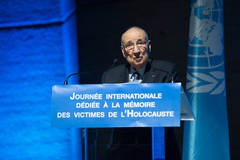
GCED Basic Search Form
Quick Search
You are here
News

UNESCO Director-General, Irina Bokova, commemorated the International Day in Memory of the Victims of the Holocaust through a series of events devoted to the work of education, the transmission of history and the fight against all forms of anti-Semitism today in the world.
The Director-General first visited the Shoah Memorial to lay a wreath as a tribute to the victims and visited the two exhibitions devoted to the “First Genocide of the 20th Century - Herero and Nama” and the treatment of the history of “The Shoah in the Comic Strip”, from 1944 to the present day. She also inaugurated the historical exhibition Archeologia, held at UNESCO Headquarters until 10 February in partnership with the Auschwitz-Birkenau State Museum, which for the first time presents to the public nearly 200 objects among 67,000 personal belongings of Camp victims, discovered in 1967 near Crematoria III. "The Nazis wanted to erase all traces of the Jewish people, and even the traces of their crime, as if nothing had ever existed - these objects are tangible traces and acts of resistance against extermination, against Negationism and against forgetfulness," declared the Director-General in front of nearly 300 visitors.
UNESCO also screened the premiere of the film "The Maestro: In Search of the Last Music" by Alexandre Valenti, which recounts a man's quest to find, archive and play all pieces of music written and composed in the camps the Second World War. The screening was followed by a concert by maestro Francesco Lotoro of one of the pieces of music composed 73 years ago and performed publicly for the first time in the world.
A full day of debates was devoted to ways of deconstructing hate speech and the role of historic sites and museums in Holocaust education, bringing together several experts, including Serge Klarsfeld, UNESCO Honorary Ambassador and Special Envoy for Education about the Holocaust and the Prevention of Genocide, Jacques Fredj, Director of the Shoah Memorial, Dorit Novak, General Director of Yad Vashem, Agnès Sajaloli, Director of the Rivesaltes Camp Memorial, the historian Marcel Kabanda, President of IBUKA France, Mr Iannis Roder, history teacher at the Pierre de Geyter College in Saint-Denis and Mr Hubert Strouk, teacher at the Lycée des Arènes in Toulouse.
During the evening ceremony held at UNESCO to close the International Day of Commemoration in Memory of the Victims of the Holocaust, the Director-General wished to highlight the current fight against anti-Semitism and importance of the memory of the Shoah in education for peace. "Teaching the history of the Holocaust is at the basis of UNESCO's full commitment to anti-Semitism - as a way to make everyone understand how prejudices are turned to insults, insults and discrimination, from discrimination to murder. This effort is inseparable from all the work of transmitting Jewish history and culture, respecting its heritage, on an equal footing with other cultures, as an antidote to prejudice and ignorance," she declared.
In a stirring account, Raphaël Esrail, a great witness of the evening and President of the Union of Deportees to Auschwitz, stated that "these receding times remain close. Future generations will be able to turn to survivors’ testimonies that carry priceless value and serve as vectors for a culture of peace. This Day is the occasion to plead for Birkenau to become a unique educational site entirely built around the recorded testimonies of survivors. No museum can substitute for the encounter with a living memory of this site.”
Mr Carmel Shama Hacochen, Ambassador and Permanent Delegation of Israel to UNESCO, commended the Day’s theme dedicated to education around sites of memory, stating that "the Shoah is not only a Jewish legacy but a universal lesson," with the camps providing “understanding to people everywhere of the saddest chapter of human history.”
Eric de Rothshild, President of the Shoah Memorial, thanked Irina Bokova for her commitment: "This ceremony is an opportunity to thank you from the bottom of our hearts for these positions and for your fidelity to the memory of the Shoah, your struggle against Holocaust denial, anti-Semitism and anti-Zionism."
At the end of the evening, world-renowned pianist, Martha Argerich gave an exceptional concert with Ivry Gitlis, violinist and UNESCO Goodwill Ambassador, combined with excerpts from Elie Wiesel and Primo Levi, read by Anne-Catherine Dutoit.
